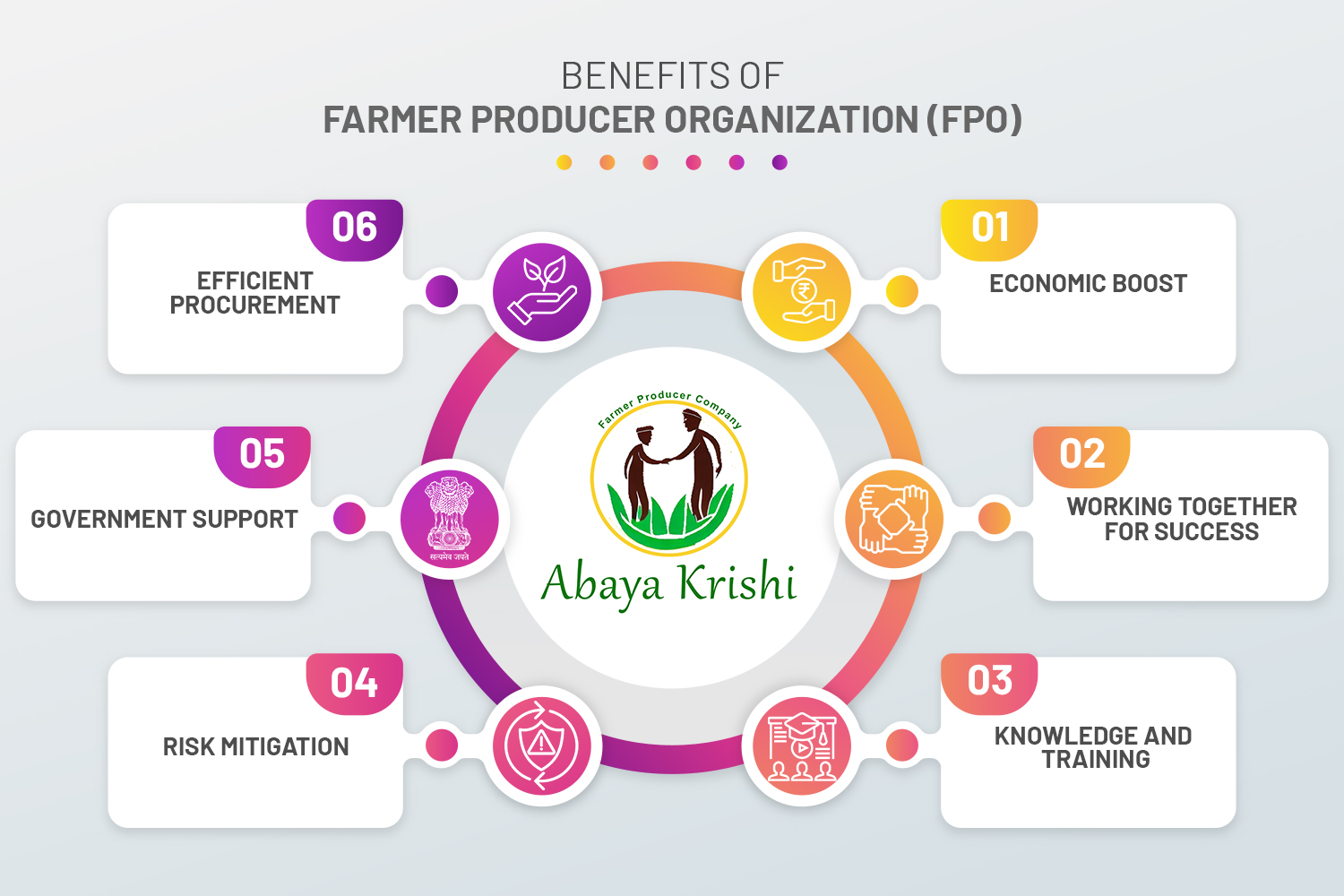Within the sphere of agriculture, where individual farmers often face numerous challenges ranging from market uncertainties to limited access to resources, the emergence of Farmer Producer Organizations (FPOs) has brought a ray of hope. These collective entities represent a paradigm shift in the way farmers operate, offering a multitude of benefits that extend beyond individual farm boundaries. The benefits of the collective strength of farmers in the form of FPOs are several.

Enhancing Bargaining Power and Market Access
One of the primary advantages of FPOs lies in their ability to amplify the bargaining power of smallholder farmers. By aggregating their produce and negotiating collectively, FPOs enable farmers to command better prices and terms from buyers, ensuring fair returns for their labour and investment. This enhanced bargaining power not only improves farmers' incomes but also leads to greater market access, allowing them to reach larger and more lucrative markets that would otherwise be inaccessible to individual producers (Ministry of Agriculture & Farmers Welfare, Government of India, n.d.).
Economies of Scale and Cost Efficiencies:
Through collective action, FPOs can harness economies of scale to reduce production costs and improve efficiency. By pooling resources for inputs, machinery, and infrastructure, FPOs can achieve cost savings that benefit all members. A study by the World Bank Group on agricultural cooperatives underscores the role of FPOs in leveraging economies of scale to enhance productivity and competitiveness (World Bank Group, 2018).
Risk Mitigation and Resilience:
FPOs play a crucial role in mitigating risks associated with agriculture, including market volatility, weather-related disasters, and pest outbreaks. Through risk-sharing mechanisms and diversification of crops and income sources, FPOs help farmers spread their risks and buffer against adverse events. Case studies from various regions have demonstrated the resilience of FPOs in coping with challenges and bouncing back from setbacks (Dakshina Kannada Zilla Panchayat, 2022). Moreover, FPOs facilitate access to insurance schemes and financial services that provide a safety net for farmers during times of crisis, ensuring their resilience and sustainability in the face of uncertainty (Food and Agriculture Organization of the United Nations, 2019).
FPOs facilitate access to insurance schemes and financial services that provide a safety net for farmers during times of crisis
Capacity Building and Knowledge Transfer:
Another significant benefit of FPOs is their role in capacity building and knowledge transfer. By organizing training programs, workshops, and field demonstrations, FPOs empower farmers with the latest agricultural practices, technologies, and market trends. This continuous learning process not only enhances the productivity and efficiency of farming operations but also promotes innovation and adaptation to changing circumstances. Furthermore, knowledge-sharing platforms within FPOs facilitate peer-to-peer learning and collaboration, enabling farmers to leverage each other's expertise and experiences for mutual benefit (Ministry of Agriculture & Farmers Welfare, Government of India, 2020).
Empowering Rural Communities:
Beyond the economic benefits, FPOs contribute to the holistic development and empowerment of rural communities. By promoting social cohesion, collective decision-making, and inclusive governance structures, FPOs strengthen the social fabric of rural societies. Moreover, FPOs create opportunities for women and marginalized groups to participate in agricultural value chains, thus promoting gender equality and social inclusion. By improving access to education, healthcare, and other essential services, FPOs enhance the overall well-being and quality of life in rural areas, resulting in sustainable development and prosperity for generations to come (World Bank, 2019).
The benefits of Farmer Producer Organizations extend far beyond individual farms, encompassing broader socio-economic impacts on rural communities.
Conclusion:
In conclusion, Farmer Producer Organizations represent a transformative model for agricultural development, offering a plethora of benefits that extend beyond individual farms to entire communities and the agricultural sector at large. The benefits of Farmer Producer Organizations extend far beyond individual farms, encompassing broader socio-economic impacts on rural communities. By enhancing bargaining power, accessing markets, achieving economies of scale, mitigating risks, and building capacities, FPOs contribute to the overall development and prosperity of the agricultural sector. As we continue to explore innovative solutions for sustainable agriculture, the role of FPOs as catalysts for positive change cannot be overstated.
References
- Dakshina Kannada Zilla Panchayat. (2022). Case Study: Success Story of Farmer Producer Organizations in Dakshina Kannada District, Karnataka, India.
- Food and Agriculture Organization of the United Nations. (2019). Farmer Producer Organizations: Key to Rural Poverty Reduction and Market Development.
- Ministry of Agriculture & Farmers Welfare, Government of India. (n.d.). Farmer Producer Organizations Promotion Scheme (FPOPS).
- Ministry of Agriculture & Farmers Welfare, Government of India. (2020). Farmer Producer Organizations: A Primer.
- World Bank Group. (2018). Agricultural Cooperatives: A Global Overview.
- World Bank. (2019). Rural Poverty and Hunger: A Global Perspective.
